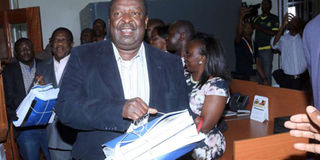Tough choices for Raila as case set to begin at Supreme Court

Nasa co-principal Musalia Mudavadi submits a document concerning their election petition to the Supreme Court on August 19, 2017. In over a half century since independence in Kenya, no court has overturned a presidential election result. PHOTO | JEFF ANGOTE | NATION MEDIA GROUP
What you need to know:
- Supreme Court justices are also establishing the long-term legacy of the Judiciary.
- In the election process, the coalition claimed it had unsubstantiated evidence the elections were rigged.
The seven members of the Supreme Court have been tasked with deciding who the next president of Kenya will be.
This can happen either by the court dismissing National Super Alliance candidate Raila Odinga’s election petition against Jubilee’s Uhuru Kenyatta or by ruling that the flaws and missteps during the elections were so egregious, they significantly altered the eventual results of the presidential race in 2017.
I do not envy the position of the Supreme Court justices.
EVIDENCE
Not only are they deciding a highly charged political case, they are also establishing the long-term legacy of the Judiciary.
This is also probably Raila’s last chance to be president.
Several questions will have to be determined by the court.
First, the admissibility of evidence presented to it by Nasa.
RIGGED
In the election process, the coalition claimed it had unsubstantiated evidence the elections were rigged.
Raila’s coalition claimed an unnamed “whistleblower” provided incontrovertible evidence their candidate was rigged out of office.
If this is the case, the whistleblower will have to be identified (in camera or otherwise) to provide evidence to support the claims.
Second, the evidence Nasa provides to the court on the question of the rigging of the IEBC server will go through significant scrutiny.
Firstly, how was Nasa able to get this evidence?
HACKING
If the server was tampered with, how credible are the numbers Nasa generated from it to declare their candidate the victor?
Nasa’s evidence will have to be water-tight in linking the mishaps during to the election to the final vote tally.
They should consequently show this changed the overall outcome of the election.
History is not on Nasa’s side.
In over a half century since independence in Kenya, no court has overturned a presidential election result.
INDEPENDENCE
Courts tend to default to precedent unless there is a clear misinterpretation of the law.
I do not think it will be any different this time.
The statement read by Raila on August 16 puts the court on the defensive.
It will not want to be seen to be pandering to pressure from the opposition leader.
He inferred that a decision against him was a choice by the court to compound the problems facing Kenya.
The court will reject the premise that a politician can influence its decisions.
OBSERVERS
Also, immediately after the election, Nasa’s officials showed no faith in the court they are now petitioning to for redress.
It’s interesting to speculate their change of heart.
Third, the legal process Raila stated on Wednesday has been overtaken by a political and diplomatic turn of events.
The observers have all called the election credible, free and fair.
The New York Times and Washington Post editorials this week painted Raila’s post-election antics as deplorable.
UHURU COMMENDED
Even the UN has rejected the opposition’s demand for the institution to audit the votes.
Regional states, the United Kingdom and United States have congratulated Uhuru Kenyatta on his election victory.
This further paints a picture of a fait accompli in accepting the results.
Whatever the ruling of the court, it is impossible for both the plaintiff and the defendant to be satisfied.
As a wise man once said, “a man’s own conscience is the sole arbiter of right and wrong”.
Only one of the contestants has a clear conscience.
The writer teaches Political Science at City University, New York




